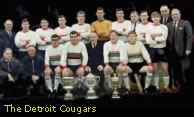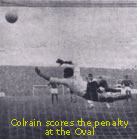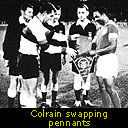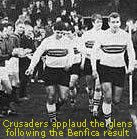|
Big John had his own hero figures - Frank
Sinatra and Arnold Palmer to name but two - but in East
Belfast he was the hero, a living legend to thousands
of Glenmen, who saw him take four trophies to the Oval
in his first season, complete an all-conquering American
tour, and remain undefeated in two European Cup games
against the mighty Benefica.
John Colrain was raised in Bridgeton,
a part of the East End of Glasgow where razors were
not always used for shaving, nor axes for chopping wood.
As a Catholic in a strong Orange area, Colrain soon
learned to look after himself.
His obessive love affair with the game
of football began when at 15 he signed provisional forms
for Celtic. The 'big mans' first ambition was realized
when on New Years day 1957, he found himself on the
Colts team to meet arch rivals Rangers.
Colrain left Celtic after six good and
formative years to spend nearly three seasons with Clyde
and a smaller period south of the border with Ipswich
Town, under Alf Ramsey and then Bill McGarry.
He joined Glentoran as player-manager
in July 1966, inheriting Billy Neill's Irish Cup winning
side of extremely talented individuals. Colrain saw
his first task as welding them into a team: "This
was the first and most vital lesson I hammered into
them. If someone is having a bad time then there must
be someone else to help him out. It's team work that
gets results".
Big John's graduation to management was
spectular. In his first season (1966-67) doubling as
inside forward and manager, Glentoran won the Irish
League Championship, the City Cup, the Ulster Cup and
the Gold Cup. They also met Glasgow Rangers in the European
Cup Winners Cup, drawing 1-1 in Belfast and losing 4-0
in Glasgow.

The following season, the Irish League
was won again. In between, the Glens had faced famous
British, Continental and South American opposition on
an American tour as the Detroit Cougars, and lost only
three out of twelve games. Malcolm Brodie, who covered
that tour for the Belfast Telegraph, tells me that,
in his view, it was the finest Irish League team of
all time.
The European Cup draw set the Glens against
the 'Eagles of Lisbon', Benfica. Colrain flew out to
Portugal to examine his opponents and was duly impressed:
"Eusebio was very much the star turn, and if anybody
didn't play the ball to him they were in the bad books.
And when he got the ball he had no intention of letting
it go. He wouldn't lay it off in an advantage position.
I knew that if did that against a side that were reckoned
Benfica's equals, he would do it even more against a
lot of unknown "scrubbers" from Ireland, which
is all we were to them. So I put Tommy Jackson on Eusebio
in both matches and said, "He's your baby - don't
let him operate." Eusebio was isolated, the squabbling
started and we were in business.

A Colrain penalty helped Glentoran draw
1-1 in Belfast, but the real triumph was in Lisbon.
Said Colrain " ..we got a goaless draw there and
it was the only time Benfica failed to score at home
in a European Cup tie. We only lost because of the rule
that away goals counted double." That result and
the formidable series of domestic accomplishments were
not Colrains only distinctions with Glentoran. He sold
six players for well over £50,000: Terry Conroy
joined Stoke City; Eric Ross went to Newcastle; Billy
Sinclair to Kilmarnock; Arthur Stewart to Derby County;
Tommy Jackson to Everton and Walter Bruce to Detroit
Cougars.

Colrain quipped, " I also sold a
fellow with a wooden leg, but I don't think he made
the first team."

In an article in the Observer, on 20 September
1969, famous sports journalist Hugh McIlvanney wrote
that, contrary to popular belief that he had taken a
handsome personal return out of those dealings, Colrain
was paid a modest £350 by the directors.
Predictably, Colrains first quarrel with
Glentoran was over money. He was publically backed by
lionising supporters who had a sit down strike on the
pitch before one match, carrying banners that included:
"Give more to Big John and spend less on Long John".
Towards the end of that first season Colrains
pay went to £35 per week from £25. His club
house cost him £3.50 out of his taxed £35.
After that remarkably successful 1967-68
season, Colrain insisted that he was worth a signing
on fee of £1,000 and a slight weekly increase
of about £5. He was sacked without ceremony.
In his book on the history of Glentoran,
Malcolm Brodie states that Alex Young, the man who succeeded
Colrain, was given £2,000 signing-on fee, £90
per week, a three year contract, free house and 2.5%
on transfers.
A bitter Colrain spilled his heart out
to Hugh McIlvanney: "When you compare the screw
I got with what I've been told Alex got when he took
over after me nobody has to draw diagrams to give you
the message."

Colrain was to suffer the fate of all
fallen stars - the black hole of oblivion. He flickered
briefly at St. Pats Athletic in Dublin, but his ambition
to manage a Scottish or English league side was never
fulfilled. Big John died prematurely of a heart attack
at his Glasgow home in 1987. He was fifty years of age.
The following words of Hugh McIlvanney,
which gave a little insight to the character and humour
of the 'big man', serve as a fitting epitaph to a Scot
who came to East Belfast, saw great success and conquered
the hearts of all fans.
|